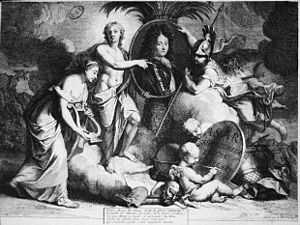Jean-Baptiste Stuck
Jean-Baptiste Stuck or "Batistin" (6 May 1680 – 8 December 1755) was an Italian-French composer and cellist of the Baroque.
Little is known of Stuck's early years. He was born at Livorno, came from a merchant family, and was the son of Giovanni-Giacomo Stuck and Barbera Hellerbeck. From 1702 he was in the service of Countess Lemos in Naples. Stuck wrote arias for the performance of the opera L'innocente inganno of Tomaso Albinoni, which was performed under the new title Rodrigo in Algieri on 10 December 1702 in Naples at the Teatro San Bartolimeo.
Shortly thereafter Stuck moved to Paris. In 1705, he published the collection Für das Jahr 1701 through the Ballard publishing house. In Paris, he was a member of the Chapelle royale and a cellist in the service of Philippe II, Duke of Orléans. In 1722, he led the cello in the opera orchestra, displacing the bass viol. In 1733 he received French citizenship. He died in Paris.

Works
Operas
He composed numerous operas
- Méléagre (1709)
- Manto la fée (1711)
- Il Gran Cid (Livorno 1715, Naples 1717)
- Polydore (Paris 1730)
and about 15 opera-ballets for Versailles.
Secular Cantatas
Stuck published four books of cantatas, in 1706, 1708, 1711, and 1714. In 1729, the Concert Spirituel performed another cantata Union de la musique française et italienne.
- 1706: Philomele. L'amant impatient. L'amant reconcilie. Contre l'ambition. Le calme de la nuit. L'Aurore et Cephale.
- 1708: Sur la prise de Lérida
- 1711: [title missing]
- 1714: Héraclite et Démocrite
External links
|